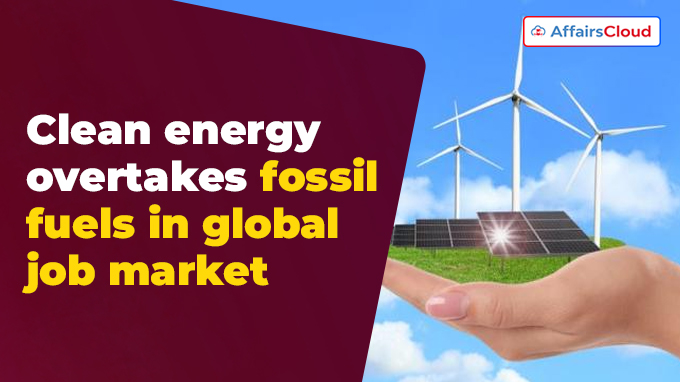
- Clean energy sectors added 4.7 million jobs globally between 2019-2022 and stand at 35 million, while fossil fuels jobs recovered more slowly after layoffs in 2020 and remain around 1.3 million below pre-pandemic employment levels, at 32 million.
- Clean energy jobs now represent over half of all energy sector jobs.
Who prepared the Report?
The report was prepared by the World Energy Outlook Division of the Directorate of Sustainability, Technology and Outlooks of IEA.
- Data from the International Labour Organization (ILO), United Nations Industrial Development Organization (UNIDO), Economic Research Institute (ERI), and national labour statistics were utilized.
Highlights:
i.An overall global energy employment in 2022 reached almost 67 million, a growth of 3.4 million from pre-pandemic levels.
ii.Over half of the employment growth is concentrated in five sectors: solar PV (Photovoltaic), wind, Electric Vehicles (EVs) and batteries, heat pumps, and critical minerals mining.
- Solar PV is the largest employer among these sectors, with approximately 4 million jobs.
iii.EVs and batteries experienced the fastest growth, adding over 1 million jobs since 2019.
iv.Construction and manufacturing make up over half of current energy jobs, with an increase of 2.6 million jobs since 2019.
v.Energy sector demands higher-skilled workers; 36% of energy jobs are in high-skilled occupations, compared to 27% in the broader economy.
vi.China had the largest increase in clean energy jobs and the most significant decrease in fossil fuel employment from 2019-22.
vii.Clean energy investment rose by 40% in 2019-22, prompting leading energy firms to hire more workers in clean sectors.
Highlights w.r.t. India:
i.Clean energy jobs drove global energy job growth in the last three years, but some regions, including India, Indonesia, and the Middle East, saw a rise in fossil fuel employment.
ii.Notably India also generated the fourth-highest number of new clean energy jobs during 2019-22.
iii.India ranks third in the number of energy workers globally, following China and the Asia-Pacific regions.
Key Points:
i.The five primary alternatives to fossil fuels are Renewable energy, Nuclear power, Hydrogen, Biomass, and Geothermal energy.
ii.The energy employment trends from 2019-22 are highlighting a growing concern about potential shortages of skilled labour that could impede the growth of clean energy sectors.
iii.The report recommends the implementation of programs by governments, industry, and educational institutions to provide the necessary expertise for the energy sector’s growth and meet clean energy project demands aligned with energy and climate goals.
About Report:
This annual report maps energy sector employment by region, fuel, technology, and value chain.
WEE 2023 includes for the first time employment data for the extraction of selected critical minerals, including copper, cobalt, nickel and lithium.
The 2023 report benchmarks energy employment needs against an outlook to 2030 across IEA scenarios, outlining key policies that could help countries cultivate and maintain a skilled energy workforce throughout the energy transition.
Recent Related News:
i.On 12th July 2023, Union Cabinet approved amendments to the Mines and Minerals (Development & Regulation) MMDR Act of 1957, for the commercial mining of 6 critical minerals: lithium, titanium, beryllium, zirconium, niobium and tantalum.
ii.On 20th July 2023, the NITI Aayog (National Institution for Transforming India) released a Revamped India Energy Security Scenarios (IESS) 2047 (IESS 2047 V3.0) to assess the integrated impact of various green energy policies of Government of India.
About International Energy Agency (IEA):
Executive Director– Dr Fatih Birol
Headquarters– Paris, France
Establishment– 1974